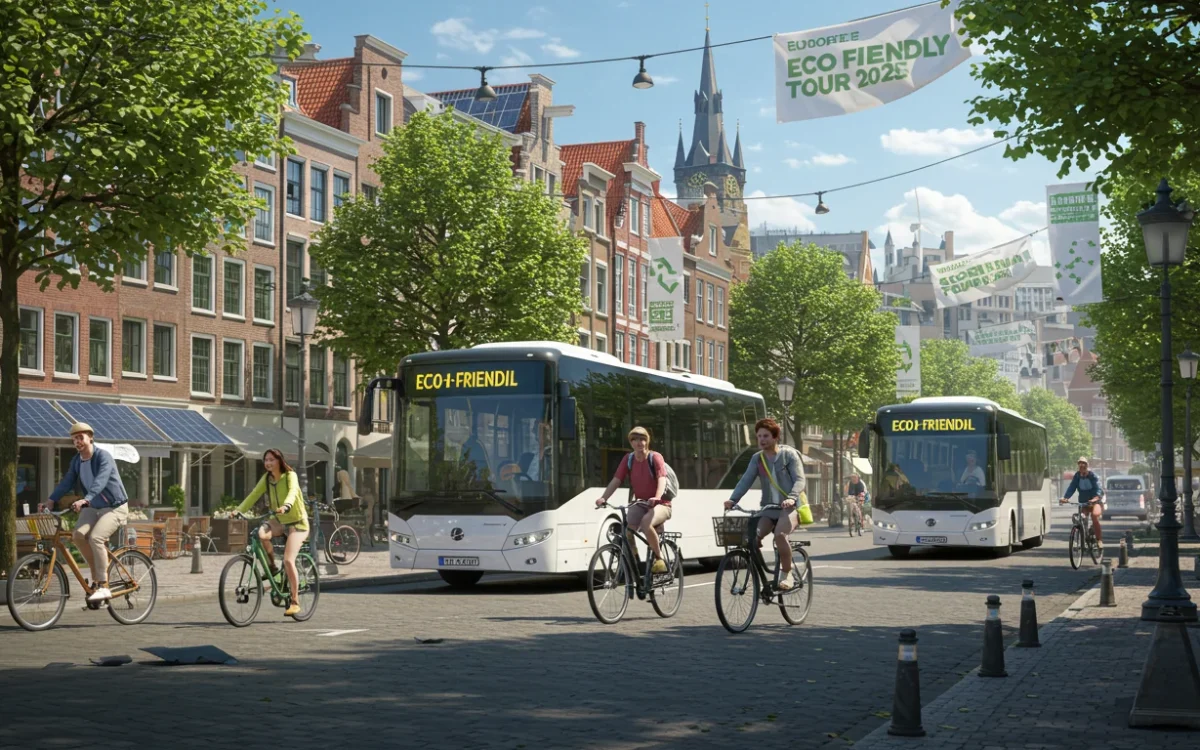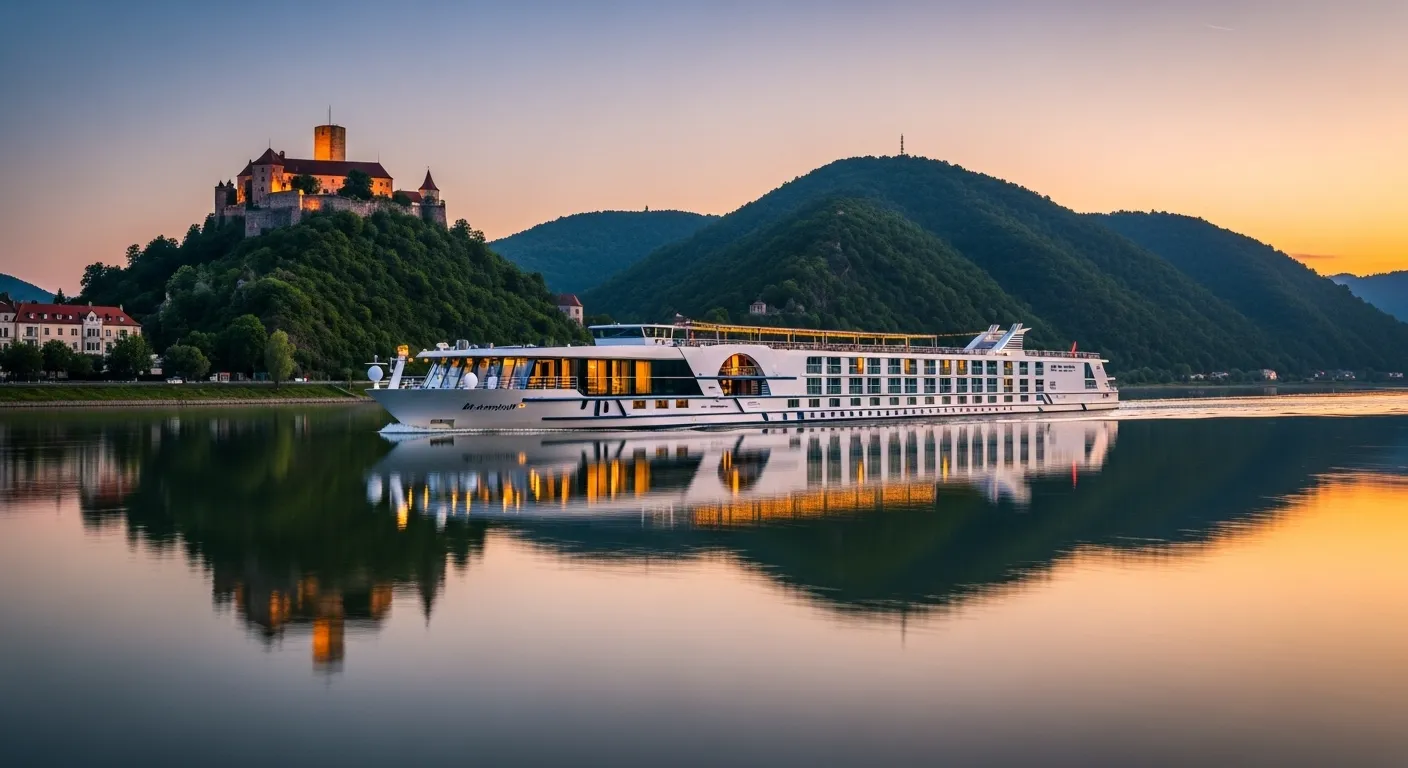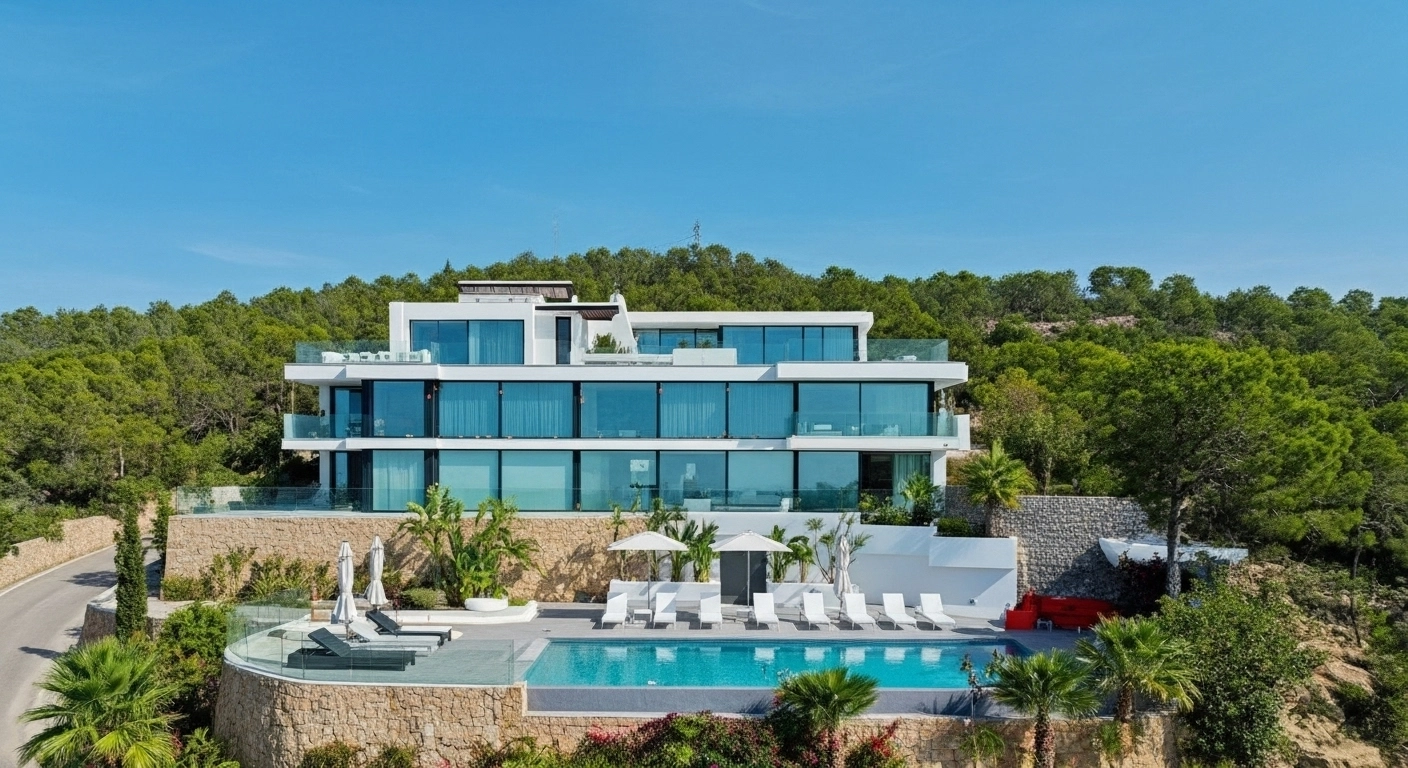Unveiling Your Ultimate Guide to a Greener, More Meaningful European Adventure
The Sustainable European Tour – The world is whispering a new travel mantra, one that trades fleeting moments for lasting impact. The days of whirlwind, checklist-driven tourism are fading, replaced by a profound desire to connect, contribute, and explore with intention. As we look towards 2025, this shift is not just a trend; it’s a revolutionary movement. An astounding 84% of travelers now say that traveling more sustainably is important to them.[1] This guide is your passport to joining this incredible evolution, crafting a sustainable European tour that’s rich in experience and light on footprint. Forget the disastrous consequences of overtourism; it’s time to embrace eco-friendly travel, discover hidden green hotels, and embark on unforgettable flight-free adventures.
This isn’t about sacrificing comfort or excitement. It’s about enhancing your journey, making it more authentic, more memorable, and infinitely more rewarding. Get ready to dive deep into the heart of a greener Europe.
✈️ 1. “Your Next Adventure Starts Here”
Don’t just dream it — live it.
Unlock exclusive deals on flights, hotels & tours before they’re gone.
👉 Book Your Escape Now »
The Unstoppable Rise of Conscious Travel: Understanding the 2025 Europe Travel Trends
The landscape of European travel is undergoing a seismic shift. Driven by a heightened awareness of climate change and a craving for genuine connection, travelers are rewriting the rulebook. The 2025 Europe travel trends point decisively towards mindfulness, purpose, and a deep respect for both planet and people.
Why Sustainable Tourism is More Than Just a Buzzword
Sustainable travel has evolved from a niche concept to a global imperative. It’s a philosophy built on three core pillars: environmental preservation, social equity, and economic viability. This means choosing travel options that protect natural habitats, honor local cultures, and ensure that tourism revenue directly benefits the communities you visit.
The European Union is taking this shift seriously, launching consultations for a comprehensive Sustainable Tourism Strategy to ensure the continent remains competitive and resilient.[2][3] This high-level focus signals a long-term commitment to making tourism a force for good, addressing critical issues like overtourism and environmental impact.[2][4]
The Data Doesn’t Lie: A Shift in Traveler Mindset
Statistics paint a clear picture of this green renaissance:
- A staggering 83% of travelers believe sustainable travel is important.[5]
- 75% of travelers plan to travel more sustainably in the next 12 months.[5]
- For the first time, over half of travelers (53%) are conscious of tourism’s impact on local communities.[1]
- Travelers are increasingly willing to change their habits, with 67% now making a conscious effort to turn off air-conditioning in their accommodations, a significant jump from 43% in 2020.[1]
This isn’t just talk; it’s action. The demand for authentic, low-impact experiences is reshaping the industry from the ground up.
What’s Driving the sustainable travel Europe trends 2025?
Several factors are fueling this green wave. The post-pandemic world has left many travelers with a renewed appreciation for nature and a desire for less crowded, more meaningful escapes. Furthermore, the visible effects of climate change have made the environmental cost of travel impossible to ignore. Younger generations, in particular, are leading the charge, seeking simplicity, connection with local cultures, and experiences that align with their values.[5] They are championing the slow travel movement, embracing eco-volunteering and locally-run accommodations over mass-market alternatives.[5][6]
Your Flight-Free European Masterpiece: Embracing the Slow Travel Revolution
Imagine trading the sterile chaos of an airport for the rhythmic click-clack of a train, watching picturesque landscapes unfold from your window. This is the heart of flight-free travel, a cornerstone of sustainable tourism that’s not just better for the planet but also for the soul. In 2025, the journey truly is the destination.
The Glorious Return of the Night Train
Once on the verge of extinction, sleeper trains are experiencing a spectacular comeback across Europe.[7] They are a brilliant way to travel, saving you the cost of a hotel night and the time of a travel day, all while significantly cutting your carbon emissions. In a world obsessed with speed, the night train offers the quiet luxury of slowing down.[7]
Iconic Sleeper Routes for 2025:
- ÖBB Nightjet (Vienna to Paris/Brussels/Rome): Austria’s national rail service is leading the night train revival, offering modern, comfortable connections between major European hubs.[8]
- European Sleeper (Brussels to Berlin/Prague): Aptly named the “Good Night Train,” this service seamlessly connects Belgium with Germany and the Czech Republic.[7][9]
- Caledonian Sleeper (London to Scotland): Wake up to the stunning landscapes of the Scottish Highlands after a comfortable night’s journey from London.[7][8]
- La Dolce Vita Orient Express (Italy): Launching in spring 2025, this luxurious service will offer glamorous itineraries exploring the length and breadth of Italy.[10]
High-Speed Rail: Connecting Countries, Reducing Carbon
Europe’s high-speed rail network is a marvel of engineering and a testament to sustainable transport.[11] It’s often faster than flying when you factor in travel to airports and security queues. New direct routes, like the high-speed Paris to Berlin service, are making it easier than ever to crisscross the continent efficiently and with a clear conscience.[10]
Beyond the Rails: E-Bikes, Ferries, and Long-Distance Buses
Your flight-free adventure doesn’t have to be confined to trains.
- E-Bikes: Perfect for exploring cities and their surrounding countrysides, e-bikes make cycling accessible to all fitness levels. Cities like Amsterdam and Copenhagen are famously bike-friendly.[12]
- Ferries: For island hopping in Greece or crossing the English Channel, ferries offer a scenic and relaxing alternative to short-haul flights.
- Long-Distance Buses: Companies like FlixBus offer an extensive and incredibly budget-friendly network across Europe, with modern buses equipped with Wi-Fi and comfortable seating.[11]
The Green Sanctuary: How to Find and Choose Genuinely Eco-Friendly Hotels
Choosing where you stay is one of the most impactful decisions you can make as a sustainable traveler. “Greenwashing” can be deceptive, but with the right knowledge, you can find accommodations that are truly committed to protecting the environment. Thankfully, an increasing number of European hotels are championing sustainability.[13]
Decoding Eco-Labels and Certifications
Look for reputable third-party certifications that verify a hotel’s green credentials. These labels indicate that a property has met rigorous standards in areas like energy efficiency, waste management, and water conservation.
- Green Key: A leading international eco-label awarded to tourism establishments.
- EU Ecolabel: The official environmental label of the European Union.
- Green Globe: A global certification for sustainable tourism.
What Makes a Hotel Truly “Green”?
Beyond certifications, here are the hallmarks of a genuinely sustainable hotel:
- Energy and Water Conservation: Use of renewable energy like solar panels, energy-efficient lighting, and systems for rainwater harvesting and water recycling.[14]
- Waste Reduction: A clear commitment to reducing waste, including eliminating single-use plastics, composting food scraps, and robust recycling programs. The Scarlet in the UK, for instance, operates with a zero-waste philosophy.[14]
- Local and Organic Sourcing: Restaurants that prioritize farm-to-table dining, sourcing ingredients from their own gardens or local organic producers.
- Community Support: Actively engaging with and supporting the local community through fair employment, sourcing from local artisans, and contributing to local projects.
- Sustainable Design: Architecture that utilizes eco-friendly, recycled, or locally sourced materials and is designed to blend harmoniously with the natural environment.
A Curated List of Top Green Hotels in Europe for 2025
- Whitepod (Switzerland): Stay in unique geodesic domes nestled in the Swiss Alps. This resort operates on renewable energy and emphasizes minimal environmental impact, offering a true immersion in nature.[12][14]
- Naturhotel Leitlhof (Italy): A carbon-neutral hotel in the Dolomites that has been named Europe’s Leading Green Hotel multiple times.[15][16] It’s a prime example of luxury meeting sustainability.
- Vila Planinka (Slovenia): This gem in the Slovenian Alps runs entirely on renewable energy and offers a sublime organic, farm-to-table dining experience, fostering a deep connection with nature.[14]
- Aristi Mountain Resort (Greece): Located in the stunning Zagori region, this resort protects its natural surroundings with energy-efficient materials, sustainable waste systems, and a complete ban on single-use plastics.[13]
Crafting Your Itinerary: The Top Sustainable European Destinations 2025
Ready to explore? Some destinations are leading the charge, embedding sustainability into their very identity. The top European destinations 2025 are those that offer breathtaking beauty and a deep commitment to preserving it for generations to come.
The Nordic Champions: Slovenia, Norway, and Finland
- Slovenia: Often called the “Green Heart of Europe,” Slovenia is a pioneer in sustainable tourism. The region of Miren Kras, a short drive from the capital, has won awards for its community-driven approach, boasting eco-friendly hotels and responsible hiking trails.[5][17]
- Norway: From its majestic fjords, which are pioneering emission-free cruises, to its commitment to energy-positive hotels, Norway is a must-see for eco-adventurers.[18] The country’s focus on low-impact activities like hiking and kayaking allows for a meaningful connection with its pristine nature.[12][18]
The Mediterranean Marvels: Portugal and Beyond
- Portugal: The Azores islands are a paradise for sustainable travel, perfect for hiking and eco-tours.[18] On the mainland, destinations like Castro Daire are being recognized for preserving cultural traditions and biodiversity.[5][17] Lagos, in the Algarve, is a model for protecting its stunning coastal areas.[5]
- Baie de Somme, France: This bay has earned top spots as an up-and-coming sustainable destination for its commitment to preserving biodiversity within its protected Natura 2000 site.[5][17]
- Belsh, Albania: A rural hidden gem, this town focuses on responsible farming and fishing, offering an authentic, sustainability-minded approach to tourism.[17]
The Urban Innovators: Copenhagen, Vienna, and Berlin
Green travel isn’t just about remote wilderness. Europe’s cities are also becoming hubs of sustainability.
- Copenhagen, Denmark: Famous for its cycling culture, the city is innovating with programs like CopenPay, which rewards visitors with perks for making green choices, such as using public transport.[19][20]
- Vienna, Austria: Consistently ranked as one of the world’s greenest cities, Vienna boasts vast public parks, efficient public transport, and a goal to be climate-neutral by 2040.[21]
- Berlin, Germany: Germany’s capital is a leader in recycling, renewable energy, and eco-friendly public transport, making it a haven for conscious travelers.[21]
Beyond the Basics: Advanced Tips for a Deeply Sustainable Journey
To truly elevate your sustainable tour, consider moving beyond the basics and embracing a more holistic, regenerative approach.
Pack with Purpose: The Minimalist’s Guide to Eco-Friendly Gear
The lighter you pack, the lower the fuel consumption of your transport. Opt for a minimalist wardrobe with versatile items. Pack a reusable water bottle, coffee cup, and shopping bag to eliminate single-use plastics. Choose solid toiletries (shampoo bars, toothpaste tabs) to reduce plastic waste and liquid limits.
Eat Like a Local, Support the Planet
Food is a gateway to culture. Support local economies and reduce your food miles by:
- Dining at locally-owned restaurants that source seasonal ingredients.
- Shopping at farmers’ markets.
- Exploring the burgeoning vegan and vegetarian scenes in many European cities.
Regenerative Travel: Leaving a Place Better Than You Found It
Regenerative tourism takes sustainability a step further.[22] The goal isn’t just to do no harm but to actively improve the places you visit. This can involve:
- Volunteering: Participate in a local conservation project or a community initiative.
- Supporting Rewilding: Visit places like Scotland or Romania that have active rewilding projects aimed at restoring natural ecosystems.[18][23]
- Choosing Regenerative Stays: Seek out hotels that are actively involved in restoring local habitats or preserving cultural heritage.
Calculating and Offsetting Your Carbon Footprint
Even with the most conscious choices, some carbon emissions are unavoidable.[24] You can take responsibility for your impact by using an online calculator to estimate your trip’s emissions and then purchasing carbon offsets.[24][25] These offsets fund projects, such as reforestation or renewable energy, that reduce greenhouse gases elsewhere.[24][26]
Ready to plan your incredible, eco-conscious journey? Finding the most sustainable routes is the first step.
<a href=”https://aviasales.tpo.lv/7QWWcJit” target=”_blank” rel=”noopener noreferrer” style=”text-decoration: none;”>
<button style=”background-color: #4CAF50; color: white; padding: 15px 25px; text-align: center; text-decoration: none; display: inline-block; font-size: 16px; margin: 4px 2px; cursor: pointer; border: none; border-radius: 4px;”>
Find Your Sustainable Flight & Train Routes
</button>
</a>
Frequently Asked Questions (FAQ) about Sustainable European Travel
Is sustainable travel more expensive?
Not necessarily! While some luxury eco-lodges can be pricey, sustainable travel often saves money. Opting for trains over planes, staying in locally-owned guesthouses, and eating at local markets can be much more budget-friendly than conventional tourism. Some data even suggests sustainable accommodations can be significantly cheaper.[1]
How can I calculate and offset my carbon footprint for a European trip?
Several reputable organizations, like Sustainable Travel International, offer online carbon calculators.[24][25] You input your travel details (flights, train journeys, hotel stays), and it estimates your emissions. You can then purchase certified offsets directly through their platforms to support climate projects.[27]
What’s the difference between “eco-friendly,” “sustainable,” and “regenerative” travel?
- Eco-friendly typically focuses on products and practices that cause minimal harm to the environment (e.g., a hotel using solar panels).
- Sustainable is a broader concept encompassing environmental, social, and economic aspects, aiming to maintain a balance without depleting resources for the future.
- Regenerative is the most ambitious approach. It aims to actively improve a destination, leaving its ecosystems and communities healthier and more resilient than they were before.[22]
Can I really travel across Europe without flying?
Absolutely! Europe’s extensive and efficient rail network, combined with modern sleeper trains, ferries, and buses, makes a flight-free continental tour not only possible but also incredibly enjoyable and rewarding.[28][29][30]
Your Journey Begins Now
Embarking on a sustainable European tour in 2025 is more than just a vacation; it’s a statement. It’s a choice to travel with purpose, to connect deeply with the places you visit, and to be a part of a positive global movement. By embracing flight-free adventures, choosing green accommodations, and supporting local communities, you are not just seeing Europe—you are helping to preserve its beauty and vitality for the future.
The adventure of a lifetime awaits, one that is as kind to the planet as it is enriching for your soul. What are your favorite tips for sustainable travel in Europe? Share your thoughts in the comments below
Sources help
- radicalstorage.com
- gtp.gr
- gstc.org
- travelandtourworld.com
- accor.com
- rupp-pr.com
- guidester.com
- thetrainline.com
- wanderlustmagazine.com
- countryliving.com
- nomadicmatt.com
- travelup.com
- enjoytravel.com
- travelsonclick.com
- worldtravelawards.com
- forbes.com
- forbes.com
- lonelyplanet.com
- travelandtourworld.com
- afar.com
- trutravels.com
- barcelo.com
- todaystraveller.net
- sustainabletravel.org
- tandem.co.uk
- airplus.com
- evz.de
- originaltravel.co.uk
- trailfinders.com
- countryliving.com







